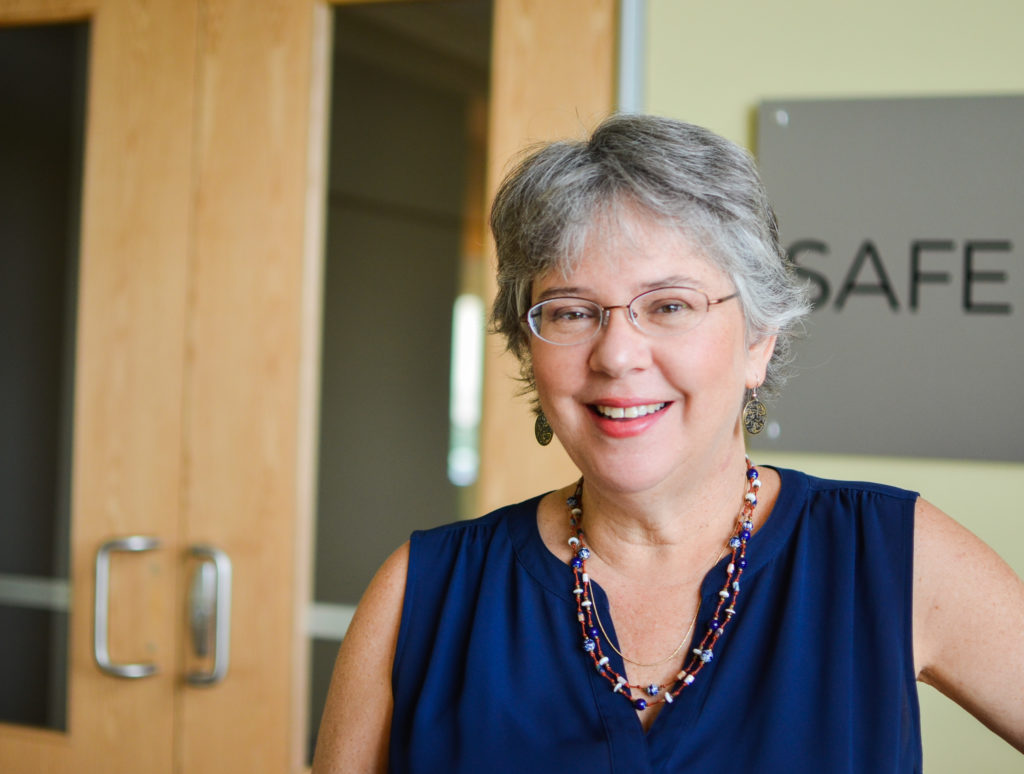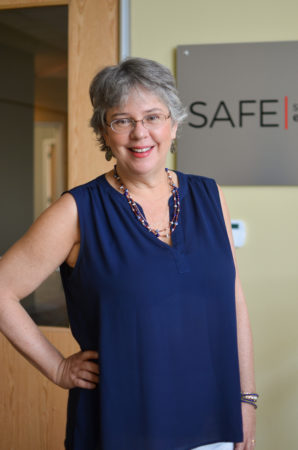Through her abuse-prevention-and-education program, Expect Respect, Barri Rosenbluth is showing kids what healthy relationships look like.
Story by Phaedra Rogers, Photos by Sarah Holcomb

The adage to treat others as you’d like to be treated is typically the gold standard in teaching kids how to relate to others. But what if a child has never been taught how to treat others with kindness? What if that child’s daily life is infiltrated by abuse, thus making violence the go-to method of relating to others? Just because something is familiar—the norm, so to speak—doesn’t necessarily make it a good thing.
That’s where Barri Rosenbluth and her team at Expect Respect at the Safe Alliance step in. Rosenbluth is the senior director of Expect Respect, a comprehensive program for kids aimed at preventing dating abuse and violence. It offers support for anyone who’s experienced violence from a dating partner. Additionally, it provides school-based counseling and support groups, educates teachers, nurses, coaches, parents and clergy on the warning signs of abuse, and teaches kids how to create healthy relationships.
Rosenbluth’s career started at the Center for Battered Women in 1990, shortly after receiving her master’s degree from the University of Texas. She was the organization’s outreach-services coordinator at a time when violence prevention wasn’t being discussed.
Noticing a problem is one thing, but changing public policy is another. She knew it would take creativity, tenacity and a touch of bravado to make a teen-dating, violence-prevention program a reality. Despite her warm and compassionate temperament, Rosenbluth’s determination was the catalyst in assembling a team committed to changing the norm.
“If adults don’t make it easier for victims to report and get help,” she says, “everyone’s safety is in danger.”
She and her team worked tirelessly to prevent bullying, sexual harassment and dating violence, striving to make schools safer for targeted students. Finally, in 2007, state legislation was passed requiring all Texas school districts to have a dating-violence policy that included enforcement of protective orders, training for teachers and administrators, and counseling for affected students.
“Every school has a portion, maybe 10 to 15 percent of students, who are struggling with multiple forms of abuse,” Rosenbluth explains. “They’re experiencing trauma, difficulty learning, unhealthy peer relationships, poor body image and substance abuse.”
That’s where Expect Respect can make the biggest impact, she says, not just at the onset of trouble, but in the midst of it as well. With its multi-level approach aimed at teacher training, positive parenting education for adults, and education and support for students, Expect Respect aims to leave no stone unturned.
It took many years of facilitating support groups, visiting classrooms and collecting data to make Expect Respect what it is today. Rosenbluth will be the first to admit it took a village to develop a program that creates quantifiable results.
 “I don’t give up easily and I’m in this for the long term,” she says. “I like to be creative and I like to have fun with other people. As I’ve gotten older, I’ve learned that I don’t always have all the answers, but I am good at engaging other people who do.”
“I don’t give up easily and I’m in this for the long term,” she says. “I like to be creative and I like to have fun with other people. As I’ve gotten older, I’ve learned that I don’t always have all the answers, but I am good at engaging other people who do.”
Her forward-thinking outreach model has put Expect Respect on the map. The initiative has received countless awards, including recognition by the U.S. Department of Justice, which means the concept is being emulated in other cities throughout the country. The program has also landed her on Oprah, NPR, World News Tonight and gotten her a seat at former Vice President Joe Biden’s Violence Against Women Act anniversary celebration.
Most notably, the U.S. Centers for Disease Control and Prevention recently published the results of its five-year evaluation of Expect Respect support groups in the Journal of Preventive Medicine. Data from the evaluation shows continued exposure to violence at home, school or in relationships is harmful and leads to greater danger to the community. According to the CDC findings, “Expect Respect support groups offer positive outcomes for students, and may provide a significant return on investment in terms of future savings.”
Through this study, Expect Respect has quantifiable data to prove it is possible to prevent negative outcomes for vulnerable youth.
“Our staff, whether they are in a counseling or educational role, show young people what it looks like, sounds like and feels like to be respected and valued,” Rosenbluth says. “We model healthy relationships with every young person in our care and with our school and community partners. If we’re going to be successful, we must live what we teach.”
Rosenbluth and her team are determined to change the trajectory for kids in need. To do so, they’re starting by changing the norm.


